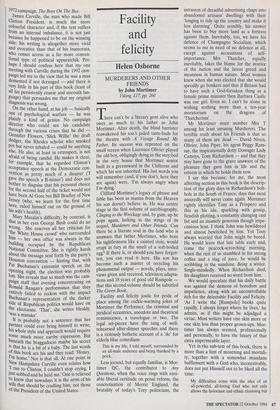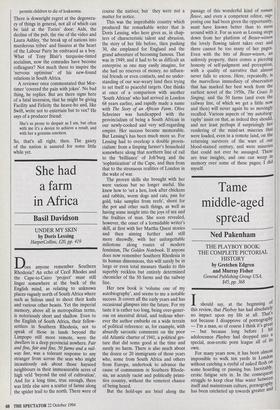Facility and felicity
Helen Osborne
MURDERERS AND OTHER FRIENDS by John Mortimer Viking, f17, pp. 260 There can't be a literary gent alive who owes as much to his father as John Mortimer. After death, the blind barrister reawakened his son's jaded taste-buds for the theatre with A Voyage Round My Father. Its success was repeated on the small screen when Laurence Olivier played the old boy, obligingly dying in the very bed in the very house that Mortimer senior built in a greensward in the Chilterns and which his son inherited. His last words you will remember (and, if you don't, here they are again) were, 'I'm always angry when I'm dying.'
Clifford Mortimer's legacy of phrase and fable has been as manna from the Heaven his son doesn't believe in. He was centre stage in the first volume of autobiography, Clinging to the Wreckage and, by gum, up he pops again, lurking in the wings of its sequel, Murderers and Other Friends. Can there be a literate soul in the land who is unaware that father Mortimer, who bore his sightlessness like a sainted stoic, would erupt in fury at the smell of a soft-boiled egg? If there is, or should you have forgot- ten, you can read it here. His son has become such a master of recycling his phenomenal output — novels, plays, inter- views given and received, television adapta- tions and 18 years of good old Rumpole that this second volume should be subtitled The Green Book.
Facility and felicity jostle for pride of place among the cockle-warming jokes of Mortimer the Performer, the criminal and juridical eccentrics, anecdote and theatrical reminiscence, a travelogue or two. The legal set-pieces have the tang of well- rehearsed after-dinner speeches and there is a riotously bathetic account of a 'do' for elderly blue comedians:
This is my life, I told myself, surrounded by an all-male audience and being thanked by a prick.
Less jocund, but equally familiar, is Mor- timer QC, the contributor to Any Questions, when the voice rings with envi- able liberal certitude on penal reform, the concretisation of Merrie England, the brutality of today's Tory politicians, the Intrusion of dreadful advertising chaps into abandoned artisans' dwellings with their `longing to tidy up the country and make it less alarming'. Quite sensibly, his answer has been to buy more land as a fortress against them. Inevitably, too, we have his defence of Champagne Socialism, which seems to me in need of no defence at all, except against accusations of self- importance. Mrs Thatcher, equally inevitably, takes the blame for the avarice of the nation and the latent greed and meanness in human nature. Most women knew when she was elected that she would speedily go bonkers and that if Britain had to have such a God-forsaken thing as a female prime minister then Barbara Castle was our girl. Even so, I can't be alone in wishing nothing more than a ten-year moratorium on the dragons of `Thatcherism'.
Mr Mortimer must number Mrs T among his least amusing Murderers. The terrible truth about his Friends is that so many of them are dead — David Niven, Olivier, John Piper, his agent Peggy Ram- say, the inspirationally dotty Dowager Lady Camoys, Tony Richardson — and that they may have gone to the grave unaware of the pleasure they gave him in life and the esteem in which he holds them now.
I say this because, for me, the most affecting section in this book is the descrip- tion of the glory days in Richardson's bolt- hole in the South of France; days that most assuredly will never come again. Mortimer rightly identifies Tony as a Prospero and this as his isle, sparkling with gossip, fiendish plotting, a constantly changing cast list and an insanely generous though impe- cunious host. I think John was bewildered and almost bewitched by him. Yet Tony always worried that John might be bored. He would leave that late table early and, come the peacock-screeching morning, when the rest of us stumbled in for strong coffee and a slug of juice, he would be scribbling in the sunshine. Being a writer. Single-mindedly. When Richardson died, his daughters received no word from him.
We would speculate that his daily battle was against the demons of boredom and impatience, along with an uncontrollable itch for the delectable Facility and Felicity. `As I write the [Rumpole] books quite rapidly, I always forget where he lives,' he admits, as if this might be adjudged a virtue. Most writers have one skin more or one skin less than proper grown-ups. Mor- timer has always seemed, professionally and personally, to have the luxury of that extra impermeable layer.
Yet in the sub-text of this book, there is more than a hint of mourning and mortali- ty, together with a somewhat mundane bafflement with a God who, inconceivably, does not put Himself out to be liked all the time:
My difficulties come with the idea of an all-powerful, all-loving God who not only allows the holocaust and ethnic cleansing but permits children to die of leukaemia.
There is downright regret at the degenera- cy of things in general, not all of which can be laid at the Tories' door: Aids, the decline of the pub, the rise of the video and Laura Ashley, `the break up of nations into murderous tribes' and fissures at the heart of the Labour Party he embraced as a boy. What of Tony Blair's turquoise-tinted socialism, now the comrades have become colleagues? Not much there to inspire the `nervous optimism' of his new-found relations in South Africa.
A reviewer once commentated that Mor- timer `covered the pain with jokes'. No bad thing, he replies. But are there signs here of a fatal inversion, that he might be giving Facility and Felicity the heave-ho and, like Swift, write not to entertain but to vex? He says of a producer friend:
She's as prone to despair as I am, but often with me it's a device to achieve a result, and with her a genuine emotion.
So, that's all right, then. The gaiety of the nation is assured for some little while yet.











































































 Previous page
Previous page